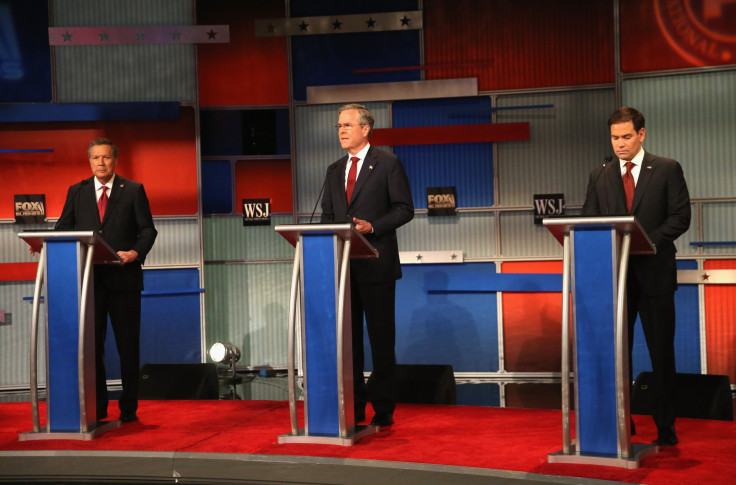How Much Do Welders, Philosophers Make? Marco Rubio's GOP Debate Argument Dominates Social Media Despite Facts

Florida Sen. Marco Rubio came out in support for vocational training programs Tuesday night at the fourth Republican primary debate. While responding to a question about why he wouldn't raise the minimum wage and what government initiatives he would roll back, Rubio said he thought one of the ways the United States could help its workers was to make higher education faster and easier to access.
"For the life of me, I don't know why we stigmatize vocational education," he said. "Welders make more money than philosophers. We need more welders than philosophers."
Rubio's comments made an instant splash on social media. Analytics firm Brandwatch found that it inspired an early peak in online discussion, with more than 2,000 mentions on sites like Twitter, Facebook and Instagram in a single minute. Shortly afterward, Google searches for "welding classes" skyrocketed to 1,300 percent their normal amount.
But was Rubio's claim true? It depends on the data you're using. Salary.com shows that the median annual salary for philosophy instructors comes in at about $42,000, while an intermediate-level welder makes about $41,000. The disparity grows when a philosophy professor's income is compared with a senior welder's: $90,000 versus $50,000.
The Bureau of Labor Statistics showed that in 2012, the most recent year for which it posted data, the country's roughly 357,000 welders, cutters, solderers and brazers made about $36,000 a year. However, the job outlook was slower than average at about 6 percent. The BLS reported only 23,000 postsecondary philosophy teachers in the U.S. making about $71,000, though its projected growth rate was 10 to 19 percent.
As a philosophy major I can see the appeal of being a welder. #GOPDebate
— Berto Scalese (@BertoScalese) November 11, 2015
So Senator Rubio, ur going to quit your job as senator to be a welder, right? We have enough politicians #GOPDebate
— Alexuh ♊♊ (@umakemesickkk) November 11, 2015
I completely missed "welder" when designing my debate drinking game. #GOPDebate
— Kimberle Glazer (@kimmieg56) November 11, 2015
I don't think I have ever seen a single line dominate social media during a debate as much as Rubio's welder-philosopher line.
— Andrew MacDowell (@amacdowell) November 11, 2015Heading into Tuesday night, billionaire Donald Trump was leading the pack with 28.3 percent support of likely GOP primary voters, according to the HuffPost Pollster. Neurosurgeon Ben Carson was in second place with 20.5 percent backing, followed by Rubio, Texas Sen. Ted Cruz and former Florida Gov. Jeb Bush, in that order.
The top eight candidates faced off at 9 p.m. EST in the primetime debate, while four others -- New Jersey Gov. Chris Christie, Louisiana Gov. Bobby Jindal, former Arkansas Gov. Mike Huckabee and New Jersey Gov. Chris Christie -- participated in the "kiddie table" event at 7 p.m. The debate was set at the Milwaukee Theater and hosted by Fox Business and the Wall Street Journal.
The showdown was advertised as an improvement to the Oct. 28 CNBC debate, which faced criticism for leading questions and unprepared moderators. The next GOP debate was set for Dec. 15, and a Democratic debate was scheduled for Saturday. Both parties will have debates in January, February and March.
© Copyright IBTimes 2025. All rights reserved.






















